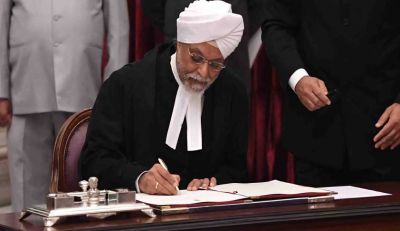India’s judicial system is primarily composed of three types of courts; the supreme court, the high courts, and the subordinate courts.
The hierarchy of the judges in the courts is responsible for maintaining law & order and giving judgment on a case within a state or country on the ethical grounds of the constitution.
The judiciary is one of the three pillars of the constitution of India, which is why there is a special mention of the Judge Salary in India. The judge’s salary, allowances, privileges, and pension are determined by the parliament from time to time.
The salaries of the Supreme Court and High Court judges are charged from the consolidated fund of India and the consolidated fund of the state, respectively.
Judges are among the most respected and prestigious professionals in the country. To become a judge in the Supreme Court, it requires an undergraduate degree in LLM/LLB and a minimum of five years of experience in the High Court as a judge.
To practice in the high court, one should have an LLM/LLB and 10 years of experience as an advocate of a high court. Furthermore, to practice as a subordinate judge in India, one must hold the degree LLM/LLB and must have passed the SPSC exam.
In this article, the salaries and allowances are covered hierarchically from the Supreme Court judges to subordinate court judges in India.
List of the Judge Salary in India
Article 125 of the Indian Constitution specifies that the judges of the Supreme Court shall be paid their salaries as specified in the second schedule of the constitution.
Salaries cannot be reduced except in a financial emergency. The updated salaries of judges are:
COURT | POSITION | REVISED PAY-SCALE AFTER 7TH PAY COMMISSION |
|---|---|---|
1. Supreme Court |
| ₹2,80,000/per month |
2. High-Court |
| ₹2,50,000/per month |
3. District Level Courts a) Civil Court |
| ₹70,550-76,070/p.m. ₹57,700-70290/p.m. ₹51,550-63,070/p.m. |
b) Criminal Courts |
| ₹70,550-76,070/p.m. |
c) Revenue Courts |
| ----- |
4. Subordinate level courts |
| ₹39,530-54,010/p.m. ₹27,700-54,010/p.m |
List of Allowance of Judges
They enjoy numerous perks from the government apart from their salary including:
1. Government Residence & Maintenance
Residential accommodation provided to judges is:
CJI – Furnishing allowance ₹10 lakh, Pension – ₹16 lakh/p.m., and Sumptuary allowance – ₹45,000/p.m.
District Judge – 2500 sq. ft.
Civil Judge – 2000 sq. ft. (6BHK, if not available, 5BHK minimum).
Chief Judicial Magistrate/SDJM/ADJ – 5BHK flats minimum.
Furniture grant to judicial officers of ₹1.25 lakh every five years.
2. Security
Home guards are provided to all judicial officers from J Division to the DJ level. 24x7 gunmen for judicial officers looking at criminal cases.
The PDJ and Chief Judicial Magistrate are provided with two gunmen and 4-5 guards at the residence.
Official vehicles to PDJ and Chief Judicial Magistrate for duty purposes.
3. Conveyance
Independent vehicles to PDJ (Principle District Judge), family Judge, Chief Judicial Magistrate, and ADJ. PDJ’s get three vehicles, and one SUV for official purposes.
Other Judicial officers can avail of fuel allowance and soft loans to purchase their desired vehicle.
The courts may provide one sedan car for every group of three officers.
4. Personal Assistance/Peons/Home Guard
- One office clerk and one bench clerk (PAs) are provided to the judicial officers, PDJ, and Chief Judicial Magistrate.
- Residence orderly peons are provided to PDJ, CJM, and other judges.
- Judges can engage with one separate peon-cum-cook at their residence, on government expenditure as per the second national Judicial Pay commission.

5. Electricity & Water Charges
- Civil Judges are granted electricity up to 6000 units per year and water up to 336 Kl per year.
- The District Judges get 8000 units per year of electricity and 420 kl water per year on government expenditure.

6. Telephone Allowance and Gadgets
- Residential landline and broadband facility up to ₹1500 for DJ and ₹1000 for CJs.
- Office telephone facility to PDJ, CMM, ADJ, Senior Civil Judge, and Chief Judicial Magistrate.
- District Judges and Civil Judges are allowed to purchase a mobile handset for up to ₹30,000 and ₹20,000 respectively.

7. Medical Allowance and Reimbursement
- Fixed medical allowance to Judicial Officers of about ₹3000 per month.
- Credit letter issue in case of a family medical emergency.
- Pensioners and judicial officers are entitled to get reimbursement by submitting the private hospital bills in the event of a medical emergency.

8. House Building Advance
There is a provision of advancement in case someone is building a house on existing land, purchasing a new property, or in case of expansion of the current household.
9. Children’s Education Allowance

- All the judicial officers will be granted a children’s education allowance of ₹2250 per month. A hostel subsidy of ₹6750 per month will be provided.
- The facility of education allowance is available in respect of two children who are studying up to 12th class.
10. Higher Qualification Allowance
- Judicial officers are entitled to three advanced increments in order to pursue higher education. Allowances if they pursue post-graduation and a Doctorate in law.
11. Specific Location Allowance
Posted in hilly areas, the specific location allowance will be given to the judicial officers of ₹5000 per month.
There is a provision that risk allowance will be given to those judicial officers who are staying in Jammu & Kashmir and some parts of the northeast states.
12. Newspaper And Magazine Allowance
A minimum of ₹1000 will be given as a reimbursement for newspapers and magazines to district judges. The civil judges will be given the ₹700 per month for newspapers and magazines.
Conclusion
The salaries of judges are decided by the parliament from time to time as per the Supreme Court Judge Act, 1958. Judges, being guardians of the constitution; also increase the risk factors for them.
That is the reason why they are granted so many luxuries and allowances, aside from the salary. Revenue courts are part of the executive body, which means they are controlled by the state government.
Revenue courts deal with cases such as land-related issues. Under the revenue courts, collectors are the head of the district level courts, followed by tehsildars and assistant tehsildars.
All the opinions given in this article are of the author(s). Digimy Business tries to serve you the most difficult topics in the easiest way.
All the information given in this article is covered Judge Salary in India. However, it does not represent that the information is completely up to top-notch. There can be additional pieces of information too.
Frequently Asked Questions
Q1. What is the starting salary of a judge?
The starting salary of a supreme court judge is approximately ₹28,000 per month. Whereas, the salary of a junior civil judge starts at 12,000 per month. Salary depends on the experience and position of a judge.
Q2. Who is the highest-paid judge in India?
The Chief Justice of India is the highest-paid judge in India. The Chief Justice of India is one of the most senior most judges in the supreme court and the highest-ranked judge in India.
Aside from the highest salary, he is entitled to receive luxurious allowances.
Q3. Are judges rich in India?
Every professional in any field gets enough salary to sustain them. The most fascinating perk judges get is allowances. The financial, medical, domestic help, maintenance support, etc. are provided to them to sustain their lives in a better way.
Q4. Who is more the powerful judge or IAS?
A judge is a part of an independent body structure, which means they take their own decisions for the welfarement of people.
Whereas, the IAS is a part of the executive body, that works under the government's direction. Both are powerful in their fields.


